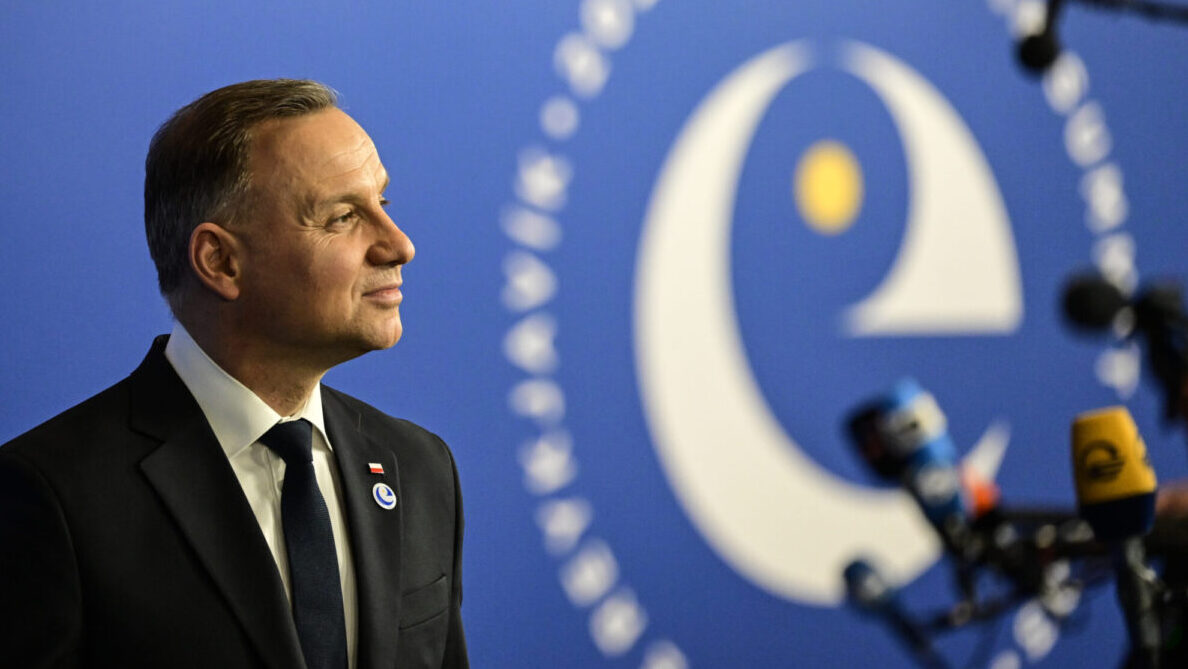
Poland’s President Andrzej Duda arrives for the 4th Summit of the Heads of State and Government of the Council of Europe, in Reykjavik, Iceland on May 16th, 2023.
JOHN MACDOUGALL/AFP
A far-reaching bill, whose purpose is to take all Russian influence out of Polish politics and target public servants unduly under Moscow’s sway, is causing quite an uproar.
Polish President Andrzej Duda said Monday, May 29th that he decided to sign the bill, which critics fear will be misused to silence opposition members as it prevents them from participating in the general election this autumn.
Last Friday, May 26th, the Sejm, Poland’s lower house, where the PiS party holds a majority, passed the bill, thereby overturning the upper house’s earlier veto. It was then left for President Duda to sign it.
If made law, a special commission will be set up to investigate Polish politicians on whether they had been under Russian influence between 2007-2022. Those convicted would be banned from holding public office for up to 10 years.
The commission’s first report is expected in September, just before elections in October or, at the latest, November.
By the Polish president’s own admission, the fledgling commission’s first task would be to look into opposition party Civic Platform (PO), and more specifically its chairman, former Prime Minister Donald Tusk, who the ruling Law and Justice Party (PiS) deems responsible for having made Poland overly dependent on Russian gas during his 2007-2014 tenure as the head of government.
Regarding Poland’s dealings with Russia on the energy front, Tusk’s track record does not indicate any such overreliance. Although Poland did sign a deal with Russia’s Gazprom in 2010 for the construction of a liquefied natural gas (LNG) import terminal, it also allowed for the import of non-Russian gas, started under his leadership.
Indeed, well before Russia’s invasion of Ukraine in February 2022, Poland was already making headway in diversifying its energy supplier portfolio.
President Duda said he believed the bill “should enter into force” but added that Poland’s Constitutional Tribunal would be asked to examine the constitutional integrity of the proposed legislation.
Yet, this process means that the legislation is in force until the Tribunal decides to either scrap or allow it, a process which could take many months.
Duda also voiced support for a similar commission to be set up at the EU level and would ask Prime Minister Mateusz Morawiecki to raise the issue at the next European Council meeting—presumably at the Meeting of the European Political Community on June 1st.
Members of the PO, the largest opposition party, are up in arms over the bill, having nicknamed it the “Lex Tusk” or the Tusk Law. They see it as a blatant attempt to exclude the former PM and other popular rivals from the political process.
Borys Budka, caucus head of the PO, wrote “once again, the president’s fear and absolute obedience won over constitutional norms and elementary decency.”
Kolejny raz strach przed prezesem i bezwzględne posłuszeństwo wygrały z normami konstytucyjnymi i elementarną przyzwoitością. (p)Rezydent
— Borys Budka (@bbudka) May 29, 2023
“In a normal democratic country, somebody who is president of that country would never sign such a Stalinesque law,” PO lawmaker Marcin Kierwinski told broadcaster TVN 24.
Krzysztof Gawkowski, caucus head of the Left, tweeted:
“President Andrzej Duda chose the interests of the PiS, not the interests of Poland! It is a shame and a disgrace that such a man is head of state!”
Prezydent @AndrzejDuda wybrał interes PiS, a nie interes Polski! Wstyd i hańba, że taki człowiek jest głową państwa!
— Krzysztof Gawkowski (@KGawkowski) May 29, 2023
The Polish Judges’ Association, Iustitia, has since come out saying the bill was in breach of the EU’s values.
While Brussels has expressed concern over the bill and its implications, it is, for now, keeping its options open. “I can assure you that we will not hesitate to take immediate action as necessary when we see that there is space and need for such action,” the Commission’s Vice President for Values and Transparency Věra Jourová said during a press conference.
In the European Parliament, the topic will however be under discussion as early as this week. “The EPP group calls for a debate on the issue this week in plenary, and expects Council and Commission to take firm positions on this as well,” EPP leader Manfred Weber told Politico.
We are concerned by new Polish legislation that could be misused to interfere with Poland’s elections. This law to create a commission to investigate Russian influence could be used to block the candidacy of opposition politicians without due process. https://t.co/KOdishlgSS
— Matthew Miller (@StateDeptSpox) May 29, 2023
Editors’ note: This article was originally published 30 May 2023. It has been updated on 31 May 2023 to include reactions to the proposed legislation.
